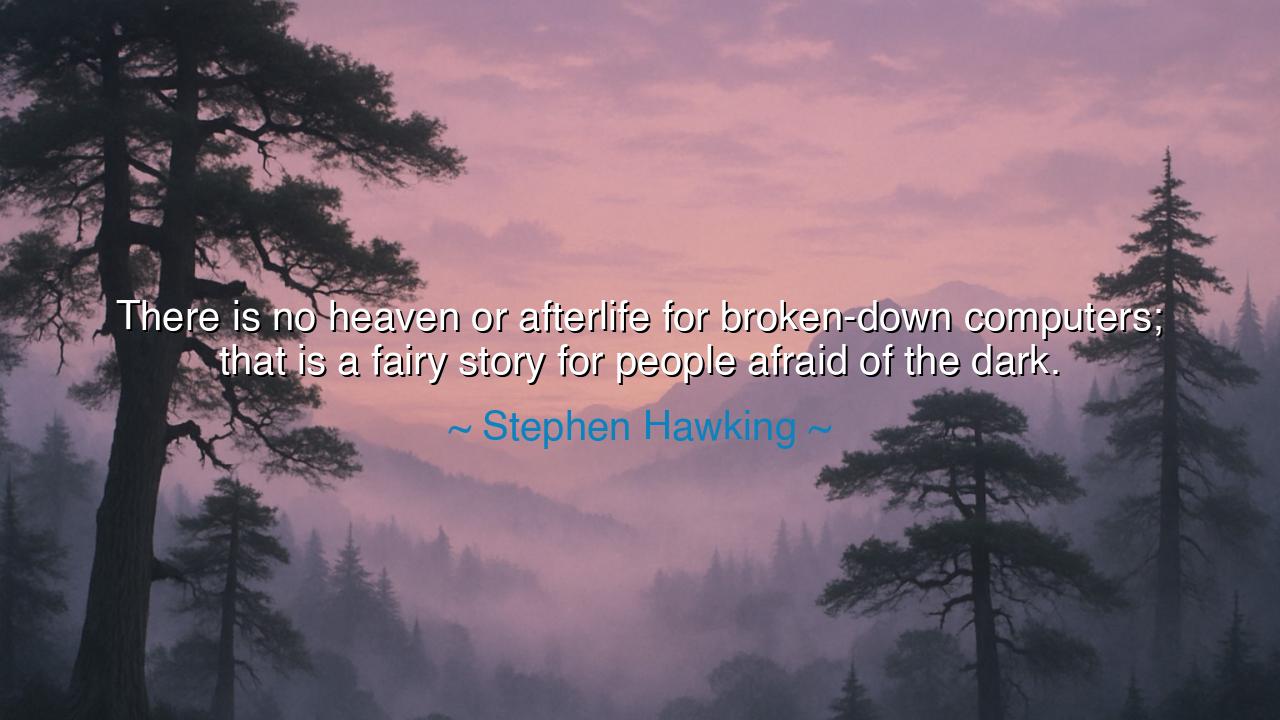
There is no heaven or afterlife for broken-down computers; that
There is no heaven or afterlife for broken-down computers; that is a fairy story for people afraid of the dark.






In the vast expanse of human thought, there are words that pierce through the clouds of uncertainty and shine a light on the fundamental truths that guide our existence. One such utterance comes from the great Stephen Hawking, whose brilliance illuminated the deepest mysteries of the cosmos. His words, "There is no heaven or afterlife for broken-down computers; that is a fairy story for people afraid of the dark," are not merely a reflection on technology but a profound meditation on the nature of existence itself. Hawking’s assertion challenges the very essence of what many believe about life, death, and the continuation of the self.
From the dawn of civilization, the human spirit has wrestled with the most profound question: what happens after death? The ancient Egyptians, with their elaborate beliefs in the afterlife, envisioned a world where the soul would journey through the underworld, facing judgment before being granted eternal life. Similarly, the Greeks, through the words of philosophers like Plato, spoke of an immortal soul that transcends the physical world. Yet, in the face of the scientific revolution, these ancient beliefs began to be questioned, and Hawking’s words reflect a turning away from the mystical and toward a more empirical view of the universe—one in which the continuation of life is bound not by fantasies of heaven or hell but by the laws of nature.
Hawking’s statement invokes the image of the broken-down computer, an inanimate machine whose soul, if it ever had one, is gone once it ceases to function. This powerful metaphor calls into question the notion that our consciousness, like that of a computer, might somehow live on after our physical bodies have decayed. It is, as Hawking suggests, a fairy story—a comforting illusion for those who cannot bear the thought of their mortality. It is the ultimate expression of fear—the fear of the dark, the fear of the unknown, and the fear of oblivion.
To understand this, we must look back at the ancient wisdom of those who sought to understand the universe without the crutch of comforting myths. The Stoics, with their understanding of nature’s laws, taught that life and death are simply parts of the same eternal cycle. For them, the soul was not immortal in the religious sense, but rather a reflection of the order and harmony of the cosmos. When the body perished, the soul, like all things in nature, simply returned to the universe from which it came. They feared not the end, for they saw it as a natural part of life. In this way, Hawking’s perspective aligns with this Stoic belief: death is not an escape to a mystical realm but the inevitable return to the cosmic order.
Consider the scientific revolution, which began with the work of great minds like Copernicus and Galileo, who cast aside the geocentric view of the universe and replaced it with one grounded in observation and reason. Their work was not just a challenge to religious dogma, but a shift in humanity's understanding of its place in the universe. Just as Hawking challenged the notion of a supernatural afterlife, these pioneers of science sought to reveal a universe governed not by divine intervention, but by natural laws that could be understood through reason and observation.
Yet, the words of Hawking are not to be taken as a cold dismissal of the human longing for meaning. Instead, they are a call to embrace reality—to face the inherent uncertainty and transience of life with courage. For if there is no afterlife, then it becomes all the more important to live fully in the present, to find purpose and meaning in the time we have, and to contribute to the world around us. The fear of the dark—the fear of death—is natural, but it is in facing that fear that we find strength, growth, and clarity.
The lesson that Hawking’s words impart is clear: do not cling to comforting illusions of an afterlife, but face the reality of our mortality with wisdom and courage. In doing so, we free ourselves from the chains of fear and open ourselves to a life of purpose. Embrace the unknown not as a source of dread but as an opportunity for growth and discovery. Like the Stoics of old, let us seek to live in harmony with the universe, accepting the inevitable end with grace, and finding meaning not in the promise of eternity, but in the fleeting moments that make up the life we are given. Live fully, for in doing so, we transcend the need for a fairy story and embrace the beauty of the present moment.






AAdministratorAdministrator
Welcome, honored guests. Please leave a comment, we will respond soon